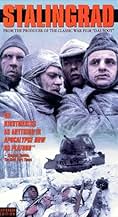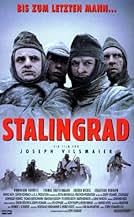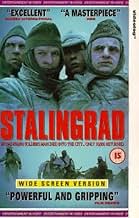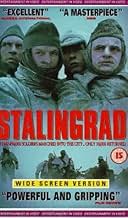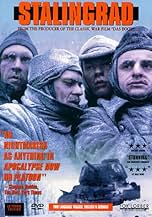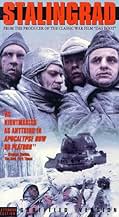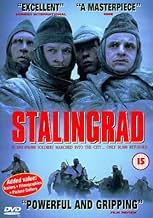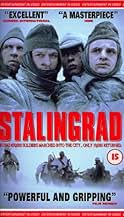Un grupo de soldados alemanes sale de Italia en el verano de 1942 en dirección a la fría estepa de la Rusia soviética, culminando en la batalla de Stalingrado.Un grupo de soldados alemanes sale de Italia en el verano de 1942 en dirección a la fría estepa de la Rusia soviética, culminando en la batalla de Stalingrado.Un grupo de soldados alemanes sale de Italia en el verano de 1942 en dirección a la fría estepa de la Rusia soviética, culminando en la batalla de Stalingrado.
- Dirección
- Guión
- Reparto principal
- Premios
- 3 premios y 1 nominación en total
- Pfarrer Renner
- (as Eckhardt A. Wachholz)
Reseñas destacadas
He's gone now, poor old fellow. He spent the last years of his life living in a Caravan/humpy on the foot of a mountain in Southern Australia, estranged from his wife, who never forgave him after she discovered he'd fathered a child to another woman during WW2 and was secretly supporting the child financially.
A kinder, more honorable man would be hard to find. I think this film succeeds in depicting the decency of the people on both sides of the conflict as well as the obligatory sadism of the Officer who ordered the firing squad shootings of Russian civilians.
It's pity the Germans still feel no WW2 Film is complete unless traces of the 'evil Nazi' are included. On the other hand it was not lost on myself at least, that the prayer scene, in which the German Army chaplain made a long point of the fact that each Wehrmacht soldier had 'God with us' imprinted under his belt buckle. While the Godless communists enemy did not.
Maybe this is a sly inclusion by the filmaker showing how European peasantry has been propagandised to hate and kill the enemy for centuries.
Stalingrad was the largest battle ever fought in human history. The Germans lost 300,000 frontline combat troops and later, the second World War. This is the best Film ever made on the subject. It is fitting that it was done by Germans.
Bernhard
The film revolves around four soldiers fighting in Stalingrad. They were transferred there to try and take the city. The film follows these men from August of 1942 to early 1943. During this time, they learn about the horrors of war and try to find a way out of the battle.
Through the entire film, one feels the desperation of the entire battle. Unlike "Enemy at the Gates" the film makers didn't try to put some sappy love story or dress up factual occurrences of the battle. This film may be fiction, but it conveys what happened in the bloodiest battle in World War II.
These men are trapped like rats, and survival at any cost, to preserve ones life is paramount. Politics and lofty notions fly out the window, as the veneer of civilized behavior is stripped off.
STALINGRAD is gripping, grotesque, poignant and pitiful in its graphic presentation of war time experience. Highly recommended.
The combat scenes themselves are even more horrific. In one scene a German soldier hits a Russian over the head with a shovel as the Russian is trying to kill Ltn. von Witzland. In another scene a German soldier is cut in half by a Russian tank shell. There are many other gruesome scenes in the film, but they are necessary. The world has to see what happened in the Battle of Stalingrad. To see its brutality. To have its heart broken at the horrendous waste of the soldiers' lives. Over 2 million people lost there lives. Only 6000 of Field Marshal Paulus' 250,000-man 6th Army survived the battle. As with the battle, the film itself does not have a happy ending. And that's the way it should be. And as you watch this film, remember one thing, not every German soldier who fought in the war was a criminal. They were mostly decent people caught up in events well beyond their control.
¿Sabías que...?
- CuriosidadesChristoph Fromm wrote the original screenplay. The producers disagreed with his more realistic direction. They had it rewritten, and Fromm took his name off the film.
- PifiasTowards the end of film a Ju52 drops a single supply parachute. When dropped out of the plane and falling towards ground, it is green, when they recover it on the ground it is white. (In reality the Luftwaffe was first using white parachutes until they realized it is too difficult to spot white parachutes on the snowy ground.)
- Citas
Lt. Hans von Witzland: The best thing about the cold is...
[Witzland dies]
Fritz Reiser: [holding the body, he laughs] You don't have to worry about sunburn. Ever been to the desert? You'd hate it. It's so hot, you're always sweating. You think you're melting, like butter. The desert is shit. Except for the stars. They're so close, you know?
[dies]
- ConexionesFeatured in The 100 Greatest War Films (2005)
Selecciones populares
Detalles
Taquilla
- Presupuesto
- 20.000.000 DEM (estimación)
- Recaudación en Estados Unidos y Canadá
- 152.972 US$
- Fin de semana de estreno en EE. UU. y Canadá
- 10.882 US$
- 29 may 1995
- Recaudación en todo el mundo
- 152.972 US$
- Duración
- 2h 14min(134 min)
- Mezcla de sonido
- Relación de aspecto
- 1.85 : 1

